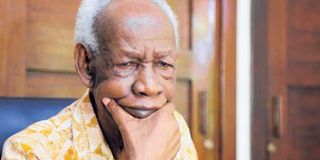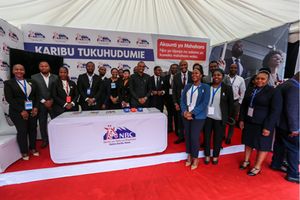Warioba digs in on need for new constitution

Former Prime Minister Joseph
Dar es Salaam. Former Prime Minister Joseph Warioba yesterday reiterated calls for a new constitution saying there will be no avoiding it if Tanzania is to chart a new course for future generations.
In an exclusive interview with The Citizen at his offices in Masaki, the former chairman of the Constitutional Review Commission said there was no other time in the country’s history than 2012 when people had an opportunity to give their opinions on the issue of a new constitution.
“Perhaps it is the issue of the new constitution, more than anything else, which can be the lasting legacy of the current administration,” said Mr Warioba in a tone that indicated his seriousness.
His remarks, however, came a day after President John Magufuli told a symposium on the current economic and political situation in the country at the University of Dar es Salaam UDSM) that the new constitution agenda was a “waste of time”.
The President said even if the government was to receive funding for the purpose he would rather use it “to build [the standard gauge] railway”.
But Mr Warioba argued that a new constitution would help build an ethical nation and protect the country’s natural resources – two of the many priorities that President Magufuli seeks to achieve. He said there was no way people could ignore it. He also said it was a unique opportunity to right the wrongs that were committed in the past.
“If we truly want to safeguard the country’s [natural] resources then this should be in the constitution,” he said.
There is nothing more important than having a constitution that takes into account the citizen’s views and opinions on how they should be governed and how their country’s affairs run, the former PM explained.
“[And] to a great extent those views are available within the draft constitution.”
In his address to the symposium, President Magufuli once again signalled the dilemma surrounding the revival of the process for a new constitution, rhetorically asking what should be the next step if the decision to proceed was made: taking the proposed draft constitution to the referendum or going back to the commission’s draft constitution. Mr Warioba warned against the danger of taking the proposed draft constitution to the referendum saying that it ran the risk of being rejected by the citizens.
“I think they will not [accept it],” he said, adding that he was personally against the idea. “And if it is sent I will be among those campaigning for its rejection.”
But he is not suggesting going back to the draft constitution either.
“What we can do is to incorporate in the proposed draft constitution, some of the good things currently left in the draft constitution and balance the two documents.”
Mr Warioba nevertheless urged for thorough debate among the citizens on how and in what ways this process can be accomplished.




